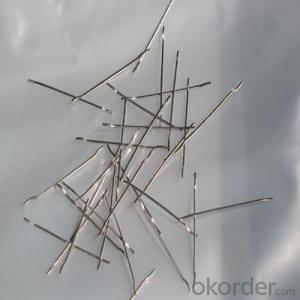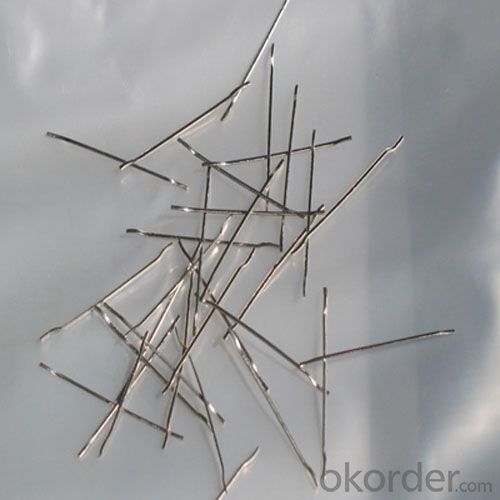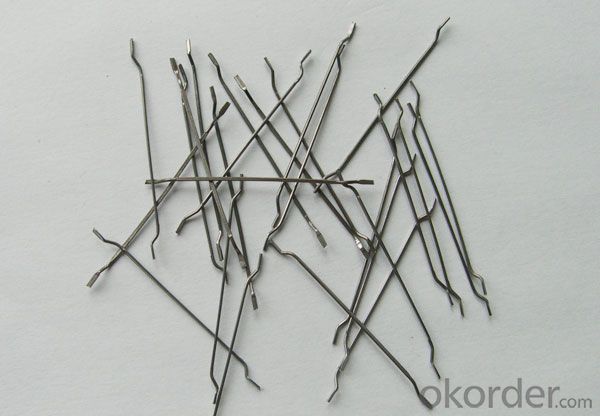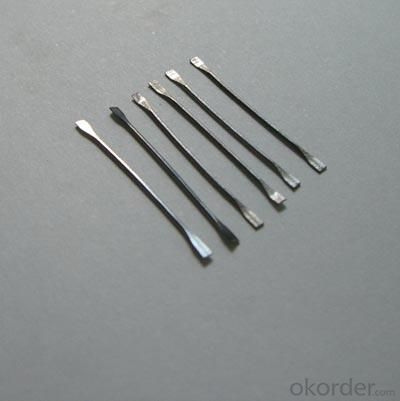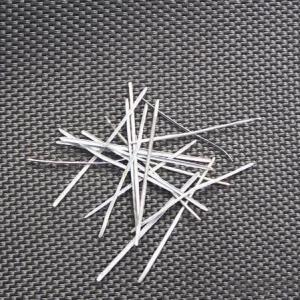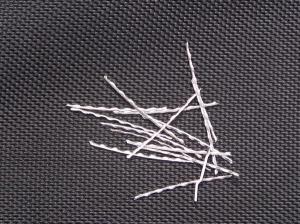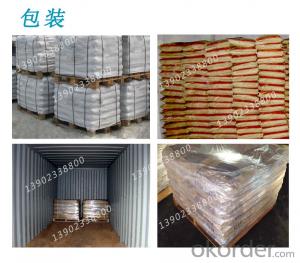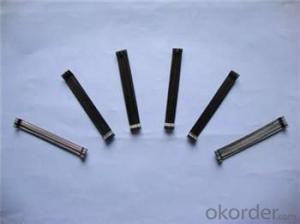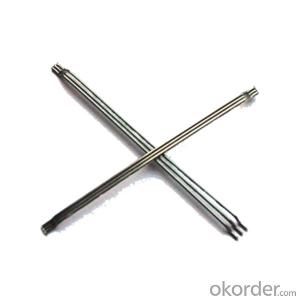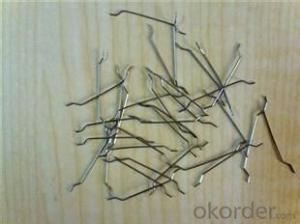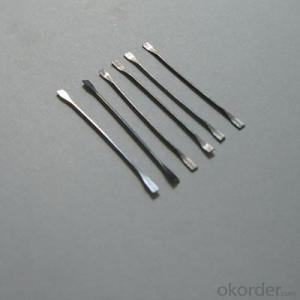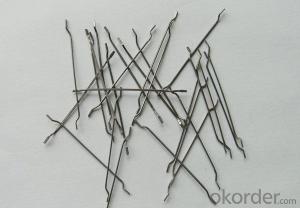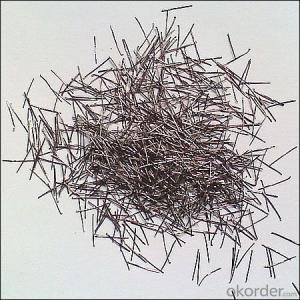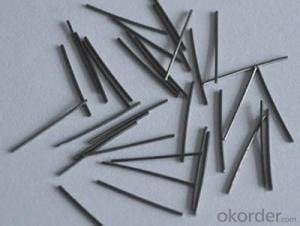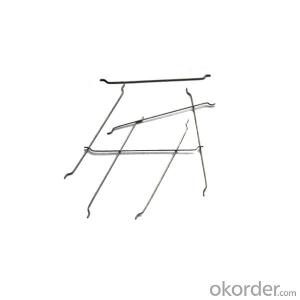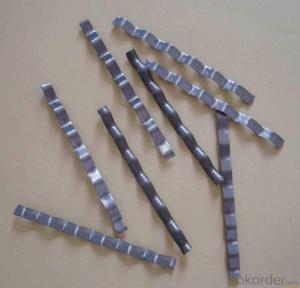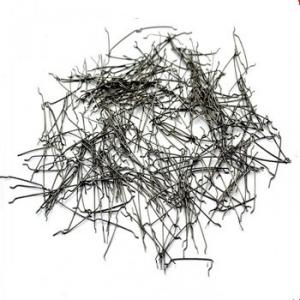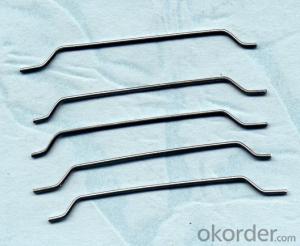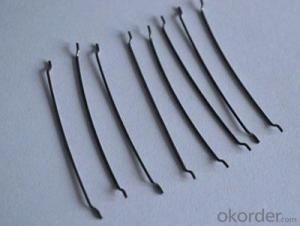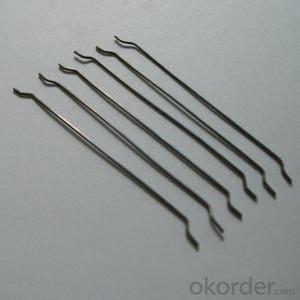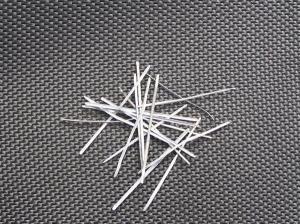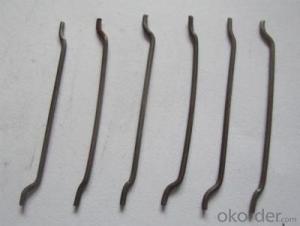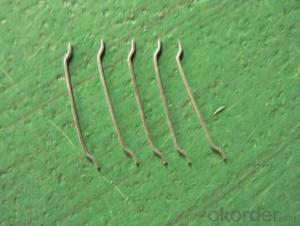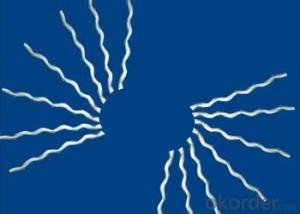Melt Extract Stainless Steel Fiber Reinforced Concrete Hookend with Copper Coating
- Loading Port:
- Tianjin
- Payment Terms:
- TT OR LC
- Min Order Qty:
- 1000 kg
- Supply Capability:
- 30000 kg/month
OKorder Service Pledge
OKorder Financial Service
You Might Also Like
Quick Details
Place of Origin: Jiangsu, China (Mainland)
Model Number: HT-ST
Material: Steel
The Products
Micro steel fiber:
1.Material: low carbon steel wire,copper coated
Diameter:0.2mm --0.25mm
Length: 12mm-14mm
Tensile strength:>2850Mpa
2.Feature:Excellent tensile, bending and shearing strength, resistance against cracking, impact and fatigue.
3.Use:It is widely used for buildings, road surface, bridges, tunnels, airport road surface, water conservancy projects, military engineering, and all kinds of building products.
Specifications
1.Material: low carbon steel wire
2.Diameter: 0.2mm --0.25mm
3.Length: 12mm-14mm
4. ISO 9001 certificated
Hooked steel fiber:
1.Diameter:0.4mm-1.0mm
2.Length: 25mm-60mm
3.Material: low carbon steel wire
4.Feature: excellent tensile,high tenacity,against cracking,impact and fatigue
5.Uses: highway road surface,tunnel,building,airport road surface and so on .
Straight steel fiber:
1) Material: low carbon steel wire
2) Diameter: 0.4mm
3) Length: 18mm-35mm
4) Tensile strength: >1000Mpa
5) Feature: excellent tensile, high tenacity, against cracking, impact and fatigue
6) Uses: highway road surface, tunnel, building, airport road surface and so on.
Picture
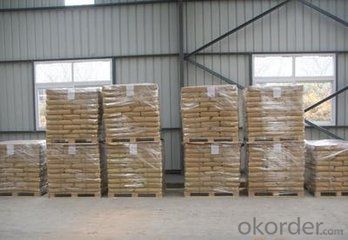
any type
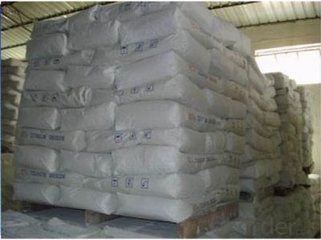
pp bag
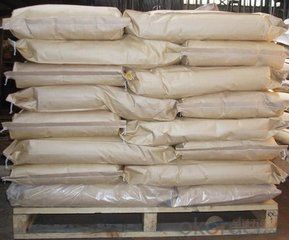
Steel fiber
FAQ
certificated: ISO 9001
Technical advantages of Daye steel fiber:
A. Improve mechanical performance of concrete
B. Provide uniform distribution throughout concrete with excellent mixing
C. No balling or caking by adopt correct mixing method
D. Reduce concrete volume
E.Save construction time and cost
F.Reduce excavation volume
G.Available for jointless floor.
- Q: Can melt extract stainless steel fiber be used in pre-stressed or post-tensioned concrete?
- Yes, melt extract stainless steel fiber can be used in pre-stressed or post-tensioned concrete. The addition of stainless steel fibers in concrete can enhance its tensile strength and crack resistance, making it suitable for applications such as pre-stressed or post-tensioned concrete. The unique properties of stainless steel fibers, such as high tensile strength, corrosion resistance, and durability, make them an ideal reinforcement material for concrete structures that are subjected to high loads or potential cracking. Additionally, the melt extract stainless steel fibers can be easily mixed into the concrete mixture and distribute evenly throughout the structure, ensuring uniform reinforcement. Therefore, melt extract stainless steel fibers are a viable option for reinforcing pre-stressed or post-tensioned concrete.
- Q: Is melt extract stainless steel fiber suitable for use in bridge construction?
- Yes, melt extract stainless steel fiber is suitable for use in bridge construction. It offers excellent strength, durability, and corrosion resistance, making it ideal for reinforcing concrete structures in bridges. Additionally, its high tensile strength improves the overall structural integrity and longevity of the bridge.
- Q: Can melt extract stainless steel fiber be used in concrete overlays?
- Yes, melt extract stainless steel fiber can be used in concrete overlays.
- Q: What is the effect of melt extract stainless steel fiber on the modulus of porosity of concrete?
- The effect of melt extract stainless steel fiber on the modulus of porosity of concrete is that it helps to reduce the porosity and increase the structural integrity of the concrete. The fibers act as reinforcement, filling in the gaps and voids in the concrete matrix, thereby reducing the overall porosity. This leads to a higher modulus of porosity, which means that the concrete becomes more resistant to cracking and deterioration.
- Q: Can melt extract stainless steel fiber be used in lightweight concrete wall panels?
- Yes, melt extract stainless steel fiber can be used in lightweight concrete wall panels. Stainless steel fibers are commonly added to concrete mixtures to improve the strength, durability, and crack resistance of the material. In lightweight concrete wall panels, stainless steel fibers can provide additional reinforcement without significantly increasing the weight of the panels. This allows for the creation of stronger and more stable lightweight concrete wall panels that can withstand various external forces and environmental conditions. Additionally, stainless steel fibers are corrosion-resistant, which further enhances the durability and lifespan of the wall panels. Therefore, melt extract stainless steel fiber is a suitable choice for reinforcing lightweight concrete wall panels.
- Q: How does melt extract stainless steel fiber affect the shrinkage cracking in concrete overlays?
- Melt extract stainless steel fiber can significantly reduce shrinkage cracking in concrete overlays. The addition of these fibers helps to distribute and absorb the tensile stress caused by shrinkage, preventing the formation of cracks. The fibers act as reinforcement, enhancing the overall durability and performance of the concrete overlay.
- Q: Can melt extract stainless steel fiber improve the bond strength of concrete to masonry units?
- The use of melt extract stainless steel fiber can enhance the bond strength between concrete and masonry units. Typically employed as reinforcement in concrete, stainless steel fibers are known for their ability to improve mechanical properties, particularly bond strength. Produced by rapidly cooling and solidifying molten stainless steel, melt extract stainless steel fibers possess a high tensile strength. When incorporated into concrete mixes, these stainless steel fibers establish a three-dimensional reinforcement network within the matrix, thereby enhancing the bond between concrete and masonry units. By functioning as miniature anchors, these fibers prevent the separation of concrete from the masonry surface during periods of stress. Consequently, the bond strength is improved, leading to increased durability at the concrete-masonry interface. Furthermore, melt extract stainless steel fibers also contribute to the reduction of micro-cracks in concrete, which further boosts the bond strength. These fibers exhibit resistance to corrosion and possess a high tolerance to alkalis, guaranteeing long-term performance and stability in the concrete-masonry bond. In summary, the addition of melt extract stainless steel fibers to concrete results in a significantly improved bond strength with masonry units, leading to a more resilient and long-lasting structure.
- Q: What is the typical aspect ratio of melt extract stainless steel fibers?
- Melt extract stainless steel fibers typically have an aspect ratio ranging from 20:1 to 100:1, indicating that the fiber's length is 20 to 100 times larger than its diameter. Consequently, the aspect ratio significantly influences the mechanical properties and performance of stainless steel fibers across different applications. As the aspect ratio increases, so does the reinforcing effect of the fibers, resulting in improved strength and durability of composites or concrete materials.
- Q: How does melt extract stainless steel fiber enhance the fatigue resistance of concrete?
- Concrete's fatigue resistance can be enhanced by adding melt extract stainless steel fiber. This reinforcement improves the structural integrity of the concrete and provides additional strength. The fibers create a three-dimensional network that helps distribute stress and load, acting as a barrier to crack propagation and preventing the formation and growth of micro-cracks that can lead to fatigue failure. The high tensile strength and ductility of stainless steel fibers allow them to effectively absorb and disperse energy during cyclic loading, reducing stress concentration at potential crack initiation points. This significantly improves the fatigue life of the concrete by preventing crack development and extending the overall durability and lifespan of the structure. In addition, the corrosion resistance of stainless steel fibers is crucial for enhancing concrete's fatigue resistance. Unlike other fibers, stainless steel fibers are not affected by corrosion from moisture, chemicals, or environmental factors. This ensures that the fibers remain effective and intact over time, even in harsh conditions, further enhancing the concrete's fatigue resistance. Overall, the inclusion of melt extract stainless steel fibers in concrete enhances its fatigue resistance by providing additional reinforcement, reducing crack propagation, absorbing and dispersing energy, and improving its durability and corrosion resistance. This results in a more resilient and long-lasting concrete structure, especially in applications subjected to cyclic loading and fatigue stress.
- Q: Can melt extract stainless steel fiber be used in roller-compacted concrete applications?
- Roller-compacted concrete (RCC) applications can indeed utilize melt extract stainless steel fiber. Unlike traditional placement and compaction methods, RCC employs vibratory rollers to compact a specialized concrete mixture. The inclusion of stainless steel fibers in RCC has the potential to improve its performance and enhance its mechanical properties. Melt extract stainless steel fibers are specifically engineered to offer high tensile strength, durability, and crack resistance. These attributes render them suitable for use in RCC applications that prioritize strength and crack resistance. To reinforce the material and prevent crack formation, the stainless steel fibers are evenly dispersed throughout the concrete mixture. This reinforcement also enhances the overall toughness and ductility of the RCC, thereby increasing its resistance to impact and dynamic loads. Moreover, melt extract stainless steel fibers exhibit corrosion resistance, which is particularly crucial in environments where the RCC may encounter harsh conditions such as excessive moisture or chemical exposure. In conclusion, melt extract stainless steel fibers can effectively improve the mechanical properties, durability, and crack resistance of roller-compacted concrete applications.
Send your message to us
Melt Extract Stainless Steel Fiber Reinforced Concrete Hookend with Copper Coating
- Loading Port:
- Tianjin
- Payment Terms:
- TT OR LC
- Min Order Qty:
- 1000 kg
- Supply Capability:
- 30000 kg/month
OKorder Service Pledge
OKorder Financial Service
Similar products
Hot products
Hot Searches
Related keywords
